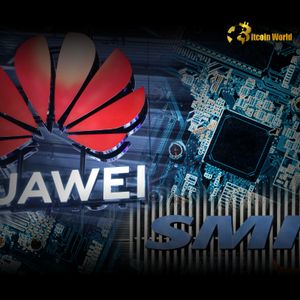Critical Taiwan Export Controls Target Huawei and SMIC
4 min read
BitcoinWorld Critical Taiwan Export Controls Target Huawei and SMIC The global technology landscape, particularly the critical semiconductor industry, is constantly shifting. For those following cryptocurrency and its underlying technologies, understanding these geopolitical moves is key. A significant development recently emerged from Taiwan, a central player in chip manufacturing, impacting major Chinese tech firms like Huawei and SMIC. This move involves new Taiwan export controls , and it has direct implications for the development of advanced technologies, including the China AI chips market. What Exactly Are These Taiwan Export Controls? Taiwan’s International Trade Administration announced an update to its list of entities designated as strategic high-tech commodities. This updated list now explicitly includes Chinese companies Huawei and SMIC, along with their various subsidiaries. What this means in practical terms is that Taiwanese businesses wishing to ship certain goods or technologies to either Huawei or SMIC must first obtain approval from the government. The trade administration stated the additions were made on June 10th and included entities from several countries, citing reasons related to combating arms proliferation and addressing national security concerns. Placing companies on this list effectively creates a barrier to accessing specific resources deemed sensitive by Taiwan. Why Target Huawei and SMIC? Huawei is a global telecommunications giant and technology company, involved in everything from smartphones to networking equipment and increasingly, AI development. SMIC (Semiconductor Manufacturing International Corporation) is China’s largest semiconductor foundry, playing a crucial role in the country’s efforts to build a domestic chip industry. Both companies have faced previous restrictions, particularly from the United States, over national security concerns. Targeting Huawei SMIC together through export controls highlights a focus on restricting China’s access to critical components and technologies needed for advanced computing and strategic industries. Taiwan, being the world leader in cutting-edge semiconductor manufacturing, holds significant leverage in this area. How Do Semiconductor Restrictions Impact China AI Chips? The primary impact of these semiconductor restrictions is on China’s ambition to develop advanced AI chips. Bloomberg reported that the controls specifically target technologies, materials, and equipment needed for plant construction related to chip manufacturing. Building and equipping modern semiconductor fabrication plants (fabs) is incredibly complex and relies heavily on specialized machinery and materials, much of which is supplied by companies in Taiwan and other regions. By limiting access to these resources, Taiwan makes it harder and potentially slower for Huawei, SMIC, and by extension, China, to build the infrastructure required to produce advanced semiconductors domestically. AI chips, especially those needed for high-performance computing and complex AI models, require state-of-the-art manufacturing processes. Delays or difficulties in acquiring the necessary plant technology can significantly set back China’s timeline for achieving self-sufficiency in this critical technology sector. The Strategic Importance of Taiwan Semiconductor Technology Taiwan’s position in the global tech supply chain cannot be overstated. The island is home to companies that are leaders in designing and manufacturing the world’s most advanced semiconductors. The Taiwan semiconductor industry is foundational to numerous global industries, including consumer electronics, automotive, and artificial intelligence. These new controls underscore Taiwan’s strategic importance and its willingness to use its technological prowess as a tool in navigating complex geopolitical relationships. While the stated reasons are arms proliferation and national security, the action is widely seen in the context of the broader tech competition between major global powers and efforts to control the flow of critical technologies. Challenges and the Road Ahead For Huawei SMIC , these restrictions present significant challenges. They will need to find alternative suppliers for the necessary plant construction technologies, materials, and equipment. Finding alternatives that match the quality and sophistication of Taiwanese offerings may be difficult and costly, potentially increasing their reliance on less advanced or less efficient solutions, or requiring significant domestic development efforts. The move also highlights the increasing fragmentation of the global technology supply chain. Countries are prioritizing national security and domestic capabilities, leading to a complex web of export controls and trade restrictions. This trend can impact innovation and efficiency globally, as companies navigate a more challenging international environment. Ultimately, the effectiveness of these controls will depend on enforcement and whether other countries implement similar measures. However, coming from Taiwan, a linchpin in the semiconductor world, these restrictions are a notable development in the ongoing effort to manage access to critical technologies that underpin the future of AI and other strategic fields. Conclusion Taiwan’s decision to place export controls on Huawei and SMIC marks a significant step in the global landscape of technology trade and national security. By restricting access to crucial plant construction technologies, materials, and equipment, Taiwan directly impacts China’s efforts to advance its domestic semiconductor capabilities, particularly in the realm of China AI chips . This action, rooted in concerns over arms proliferation and national security, underscores the strategic importance of the Taiwan semiconductor industry and contributes to the ongoing global discussion around semiconductor restrictions and the future of tech supply chains. The move presents clear challenges for Huawei SMIC and highlights the complex geopolitical dynamics shaping the future of technology development. To learn more about the latest AI market trends, explore our article on key developments shaping AI features. This post Critical Taiwan Export Controls Target Huawei and SMIC first appeared on BitcoinWorld and is written by Editorial Team

Source: Bitcoin World



